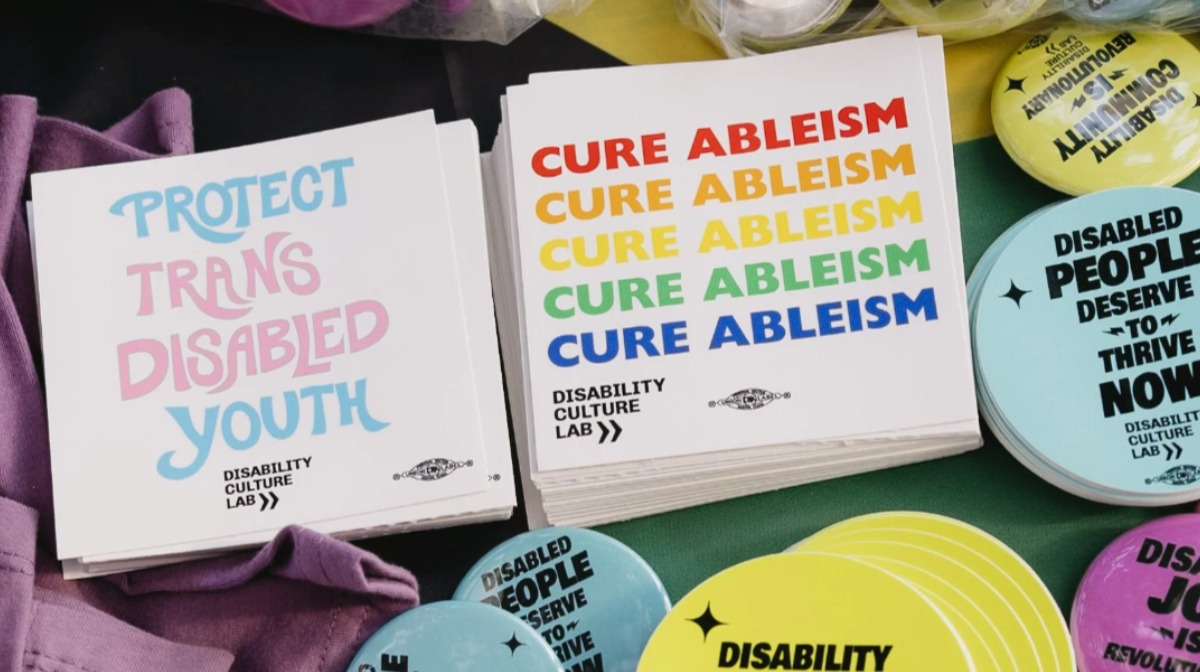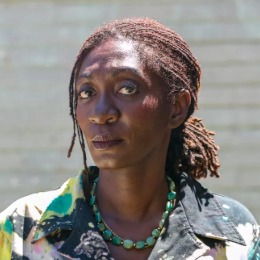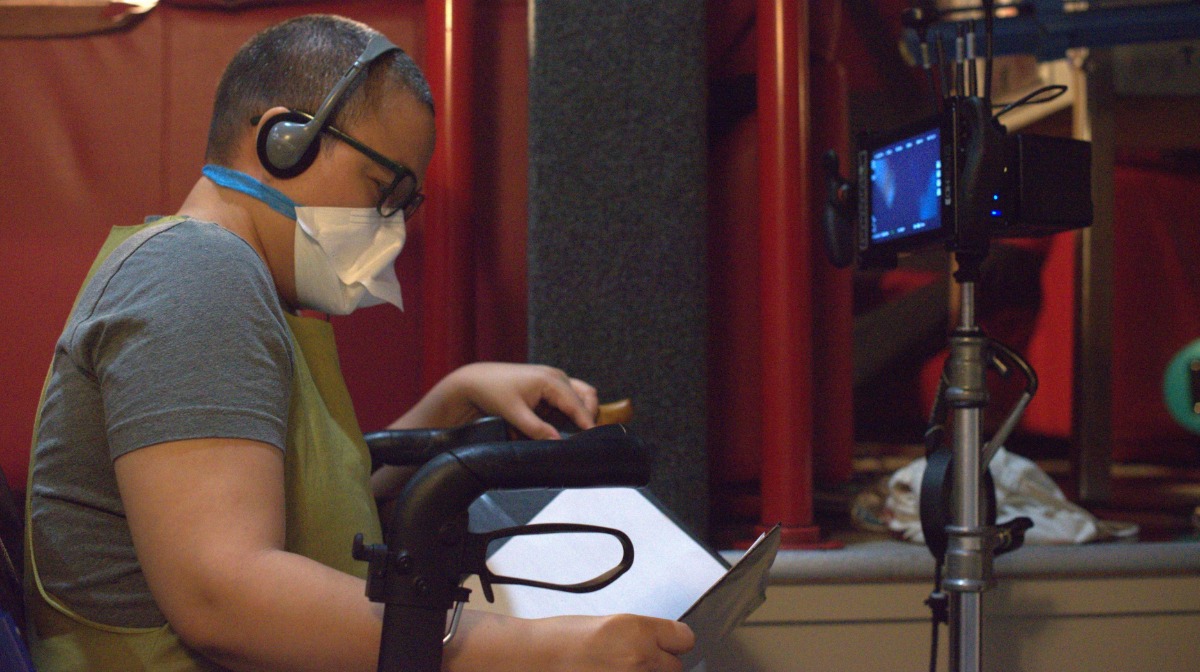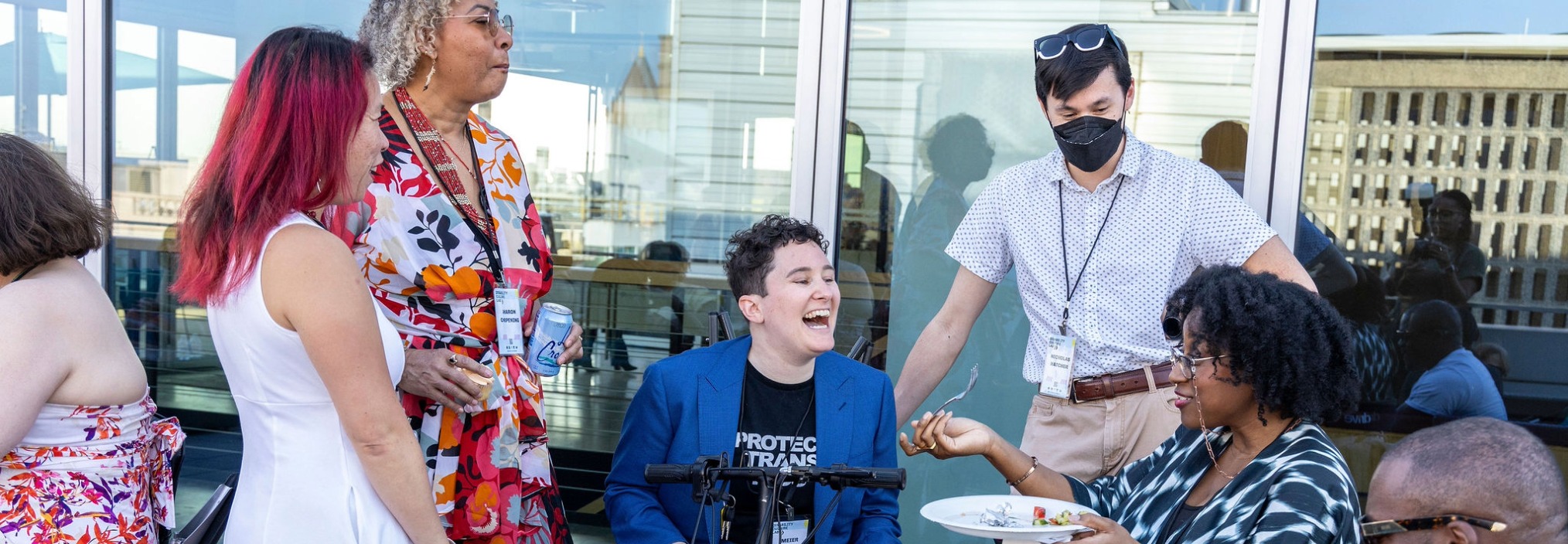Disability Culture Lab and Inevitable Foundation drive new, empowering paradigms in policy, film, and TV.
After its founding in 2022, the disability rights organization New Disabled South began establishing its long-term aspirations—building a strategy and the support needed to communicate this vision to the world.
Leaders at the organization connected with Disability Culture Lab, the first-ever nonprofit media and narrative lab working to change conventional and inaccurate perceptions of disability.
“The collaboration with Disability Culture Lab helped us nail down a clear pitch and vision for our organization that were targeted, strategic, and took into account the brilliance of our full staff,” said New Disabled South’s Deputy Executive Director e.k. hoffman.
The effort also led to the organization’s expansion of an online “plain language dashboard” that synthesizes and makes more accessible complex legislation, particularly around disability. That initiative drew widespread positive feedback “and helped us secure hundreds of thousands in funding and expand our network across the South,” hoffman said of the Disability Culture Lab partnership.
Supporting Disabled People's Voices
Over the last five years, several emerging organizations have challenged society’s inaccurate portrayals of and relationships to disabled people.
Disability Culture Lab focuses on strategic communications, storytelling, fellowships, media support, and other resources to shift the narrative on disability and create enduring change. Another organization, Inevitable Foundation, supports the work of disabled filmmakers and TV writers.
“We don’t just want to have these policy and electoral wins” hoffman said. “We want to have narrative change—the way people talk about us, think about us, make their plans, and operate around disabled people.”
“We want to have narrative change—the way people talk about us, think about us, make their plans, and operate around disabled people.”
Those objectives resonate with the Lab’s mission, which views progress on disability issues as an element of social justice progress. Disability Culture Lab Executive Director Meier Galblum Haigh noted that most people might join the disabled community at some point in life.
“The true reality of how disability happens in America is not just a car crash story,” Galblum Haigh said. They called the COVID-19 pandemic, which resulted in millions of people suffering serious, long-term, negative health effects, the “largest mass disabling moment since the Vietnam War.”
“Every form of oppression is disabling,” Galblum Haigh said. “Abusive partners are disabling. Homophobia is disabling. Incarceration itself is disabling.”
Changing the narrative around disability means disabled people speaking for themselves in media, politics, and policy. It means overcoming public fear and pity around disability and combatting myths and cliches, Galblum Haigh said. It also can mean showing that improvements such as curb cuts on sidewalks serve everyone—not solely disabled people.
“The kind of (communications) advice that we provide historically has not been available to disabled folks from disabled folks,” Galblum Haigh said of the Lab’s narrative-shifting work. “Often the advice you get is to look pitiful, look inspirational—not advice given from a power-building perspective. That traditional advice leads to bad stories and bad stories lead to bad policy.”
Formally established in 2024, Disability Culture Lab instead supports organizations telling, “authentic stories that help us build the world we need to build,” Galblum Haigh said.

Disability Culture Lab promotes narrative change through clothing and accessories created by disabled artists featuring messages about disability pride and equity. Credit: Jeevan Portraits
Changing the narrative also can be a joyful celebration of art and culture. In an online store on its website, Disability Culture Lab promotes clothing and accessories by disabled artists, including Jen White Johnson, with messages about disability pride and equity.
“The goal,” Galblum Haigh said, “is getting shirts on bodies, bags on hands, and money to disabled artists to roll out fashion as narrative change.”
Consistent with that strategy, the Lab also is launching a street art and mural project.
‘There’s No Lack’
Founded in 2021 by former filmmaker Richie Siegel and screenwriter Marisa Torelli-Pedevska, Inevitable Foundation and its support for disabled filmmakers and writers allows creatives to produce their work without the often ableist and grueling processes that characterize the film and TV industries.
Since 2021, the nonprofit has granted $1 million to disabled creatives and, in 2024, served almost 100 writers and filmmakers through a variety of programs and grants.
Alongside that, Inevitable Foundation’s Research Institute uses analyses to advocate for accessibility and issues such as health care, workers’ rights, and artistic freedom that affect disabled creatives. The research has yielded an important insight: accommodating a 25 percent disabled writing staff increased a TV series' budget by only .5 percent. This finding led to the introduction of a New York City Council bill to create a film, TV, and theater accessibility fund.
Inevitable’s multi-pronged approach works to close gaps that have pushed disabled creatives and stories to the margins.
Inevitable’s multi-pronged approach works to close gaps that have pushed disabled creatives and stories to the margins, Siegel said.
“Our goal is to get as many disabled people in those creative positions of power as possible,” he added. “It takes both the supply of the writers, storytellers, and creators but also demand for the content. If both of those things are working, the flywheel starts to go.”

Keisha Zollar, a member of the Foundation’s inaugural Elevate Collective cohort and recipient of the Inevitable Foundation x Caring Across Generations Care Award, has benefited from that flywheel via the program’s mentorship opportunities and script support for professional writers. A writer, showrunner, and producer, Zollar worked on the acclaimed TV show Dying for Sex, among others.
Disability, Zollar noted, often is portrayed as a “lack” of something.
“But there’s no lack,” she said. “It’s a different experience. Maybe it’s a lack of resources, but there’s no inherent reduction in value. I do find responsibility as a storyteller to be aware of that and to make others aware.”
Writer, director, and producer Zayre Ferrer is immunocompromised and a family caregiver, which has complicated their entertainment work, especially during and since the pandemic. Through its Visionary Fellowship, Inevitable Foundation is producing five short films, including Ferrer’s “Bembé”. In the process, Inevitable is creating safe and accessible conditions and hiring many disabled cast and crew members.

Through its Visionary Fellowship, Inevitable Foundation is producing writer, director, and producer Zayre Ferrer’s short film, Bembé. Credit: Inevitable Foundation.
“It went past our expectations of what access could be,” Ferrer said. “They asked, ‘Do you need breaks?’ I never asked myself that before; you would never say that in most [film industry] spaces. But in this space, it was encouraged. Everybody was really watching out for you.”
The short film is a proof of concept for a feature film inspired by the life of Ferrer’s father as a salsa musician in New York. The fellowship provided funding and mentorship from prominent filmmakers.
“It’s been my dream to make that movie and have my dad sing in it,” Ferrer said.
Ferrer echoed Galblum Haigh’s view that stories for and about disabled people are universal.
“The thing with disabilities is it’s the marginalized group that most people are going to join, whether they realize it or not, through accident, illness, or age,” Ferrer said. “We have a lot of stories to tell. We have a lot of energy to give.”
Since 2024, MacArthur has provided $250,000 in support to Disability Culture Lab for a fellowship program to resource the next generation of disabled leaders in media training.
Since 2022, MacArthur has provided $495,000 in support to the Inevitable Foundation to grow fellowship and professional development programs and conduct accessibility research.





